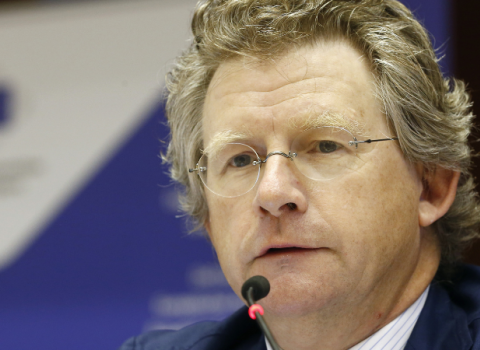
The then Irish health and children minister Mary Harney addresses the Value of Innovation workshop. Image courtesy EPPOSI.
Epposi, the European Platform for Patients’ Organisations, Science and Industry, was formed to try and square this circle by encouraging appropriate innovation in healthcare and promoting understanding of the value (as opposed to the cost) of new therapies.
This week the organisation published the report of its second workshop on innovation, which brought together representatives from industry, academe, patients and payers from all round Europe, at Dublin Castle, Ireland in January this year. The report was written by Science|Business editors Richard L. Hudson, Nuala Moran and Peter Wrobel.
The aim of the Epposi is to create a framework that can accommodate the impact of new treatments alongside old ones, and link together policy and practice across all areas of government and public life.
For Alastair Kent, from the UK Genetic Interest Group, a co-chair, the issue is the contribution that innovation makes to the intellectual and economic life of a country, as well as to its healthcare system.
This was not just a national or even a European question. “All over the world, healthcare systems are based on trust between the citizen as taxpayer and user and society as provider. We must believe that our healthcare system is there for us,” said Kent.
The demographic dimension
As the workshop highlighted, the problems generated by demographic change are unfolding inexorably. “The way we respond cannot be based on any individual view. We depend on our healthcare system, our assessment of our collective needs and our willingness to contribute to the resources required. That is why it is important [to understand the contribution of innovation],” said Kent.
EPPOSI chairman Michael Griffith highlighted the critical paradox, noting there is the potential to provide innovative solutions to healthcare problems: a wonderful opportunity – never before available – for a continuous improvement in the quality of life.
But, he warned, “The escalating costs of innovation present great challenges to society as a whole”, and in particular to those involved in health research, from patient groups to scientists, the biotechnology and pharmaceutical industries, to regulators and payers.
Griffith’s concerns were shared by Mary Harney, Ireland’s then Health Minister, who opened the workshop. “Research is very expensive, and the more we can evaluate the benefits of research – especially basic research – the better,” she said.
It is vital to build a consensus at the European level. As Harney noted, this applies not only to new products but also to the way in which healthcare systems are administered.
Erik Tambuyzer from Genzyme Europe, also a co- chair, told the meeting, “We need to improve European society’s provision of therapies for patients, but we also need to make Europe more competitive.”
Recommendations
The workshop consisted of three parallel streams, which came up with a variety of recommendations, including the need to build a model for assessing the value of an innovation. The aim would be to arrive at the overall impact of an innovation on society.
Supporting this would be a system where innovative medicines are given a conditional value, rather than a fixed price, at the time they are introduced. Such conditional reimbursement and pricing would be agreed on the basis of the knowledge available when a new medicine is authorised. The drug would then be re-priced – up or down – as more knowledge accumulates.
This could avoid delays in the introduction of expensive, innovative therapies.
Delegates also suggested there is a need to reform pharmacovigilence. The current system means new drugs have to go through at least three lengthy stages of clinical development. While it takes too long to get new medicines to the market, many problems do not become evident during Phase III trials.
In the proposed model, new medicines, especially for serious, life-threatening diseases, would be released after Phase II trials and then subject to heightened post marketing surveillance.
The aim of the meeting was not only to improve healthcare for patients, but society as a whole, by – antithetically for many – driving competitiveness and the development of the knowledge economy.
For the future, EPPOSI says it will make moves to broaden the range of stakeholders that are represented at its meetings, to include politicians, government bodies, doctors, more patients, and the investment community.
There is also a need to make the organisation more representative of the whole of Europe, by attracting delegates from more countries.





 A unique international forum for public research organisations and companies to connect their external engagement with strategic interests around their R&D system.
A unique international forum for public research organisations and companies to connect their external engagement with strategic interests around their R&D system.